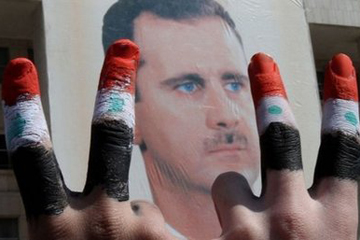The deeper the crisis in Syria, the more evident it becomes that its former ally, Turkey, has played its part in the process. As the only moderate Islamic NATO member state, Turkey has turned into a springboard for the Syrian opposition. Istanbul announced the creation of a Syrian national council, analogous to the Libyan NTC. Opposition members are actively collaborating with Turkish governmental bodies. Actually, Turkey homes a headquarters of Syrian immigrants who handle all those destructive policies at home. It was Turkey where the so-called Free Syrian Army (FSA) was formed to comprise Syrian deserters. A group of Syrian military men, who reside in a strictly protected refugee camp, have claimed responsibility for the killing of nine Syrian soldiers and an officer on Syrian territory. There is no doubt that the rebels were working off the debts owed to new bosses. The Turkish authorities say that their relations with the FSA chief Riyad al-Asad and his army are ''purely humanitarian'', while a key task for Ankara there is to ensure security of the FSA members. Turkey's Foreign Ministry seems to ignore the fact that collaboration with the FSA is the way to cause bloodshed in Syria and not ''to allow the army freely express their political views''.
The Turkish Foreign Ministry even held a press-conference for the FSA chief Riyad al-Asad, who said that his army was ''the leader of the Syrian nation'' and would ''fight against the regime until stability and peace come''. At the conference al-Asad was accompanied by ten security guards, a sniper among them. When the conference was over, journalists were told that further contacts with the FSA chief were possible only through Turkey`s Foreign Ministry. Isn`t it the best proof of the FSA being a marionette organization? Apart from the FSA, there are dozens of other militant groups traveling across the Turkish-Syrian border and bringing death and chaos in their native countries.
Hugh Pope of the International Crisis Group thinks that Turkey has been preparing for a massive interference in Syrian domestic policy. He described the alliance of Turkey and the FSA ''a brand new territory''.
Meanwhile, Russia and China have managed to prevent Turkey from interfering into Syria`s home policies. Nevertheless, Ankara has all chances to undermine stability in the neighboring country. Turkey enjoys developed economic ties with Syria, which helps maintain relative stability in the area, for example, in Aleppo, where local businessmen receive big orders from Turkey. If Ankara imposes an economic blockade on Syria, Aleppo`s economy as well as that of other Syrian cities will face a serious blow.
What will Turkey gain from toppling the Assad regime? The answer is linked to the role of Islamic factor in Recep Erdogan`s policy. Islamization of countries affected by the Arab Spring movement, which was initiated by Saudi Arabia, could not but force Turkey to take a step in a similar direction. The Syrian opposition responded to Islamic rhetoric, which is very likely to undermine the position of Damascus. Islamic symbols are being widely used in street protesters in Syria. Trying to leave behind the Saudis, the Erdogan regime has advanced in orchestrating civil unrest in Syria.
It is worth mentioning that when tensions broke out in Syria, Bashar Assad sat down for talks with the opposition to try to improve the situation. He immediately announced reforms demanded by the opposition. Nevertheless, it became clear very soon that those were not reforms which Assad`s critics wanted but the decline of the existing regime. The situation resembles much of that in Libya, which offers us more reasons to suspect that a third country is involved in the conflict.
Supported from abroad, the Syrian opposition took the risk of open confrontation with the regime. Killing the rebels is now the only way to bring peace into the region, otherwise the locals will be again and again forced into clashes with the army. In the past few months, the number of rebels has increased several times, which means that a full-scale military operation is needed to fight against them. Meanwhile, the Assad regime has been carrying out only a defensive policy, thus allowing the rebels to implement their destructive ideas. If the Syrian government fails to announce an offensive, it will face the risk of sharing the fate of Muammar Gaddafi. Assad has no more options except sending troops to restive areas.
Some observers say that Assad lacks enough will to announce such hardline measures. It means that he should be replaced by a more decisive politician, who will be ready to repeat the operation of 1982 when Assad`s father ordered a crackdown on Muslim protesters in Hama. But it was just one restive city at the time, while today the unrest affects many towns all across Syria. So, despite this being a very difficult decision to make, it appears to be the only reasonable solution to the situation, otherwise Syria will face years of bloodshed.
Ankara expects to topple the Assad regime before a civil war begins. Evidently, Erdogan wants a moderate Islamic regime in Syria, which will turn this religiously diverse country into a puppet in the hands of Pan-Turkism. This initiative is likely to be backed in NATO since the alliance is not opposed to moderate Islamists in Damascus: ''controlled by Turkey'' will mean ''controlled by NATO''.
The question is whether the Assad government will have the nerve to launch an offensive against the armed opposition? The answer will decide the country's fate. Mr. Assad has recently announced that the "Libyan scenario" is unlikely to repeat in Syria.:"...Any similar scenario will cost dearly to its producers.''
Well, the problem is that 'producers' seem to be ready to pay a very high price...
The opinion of the author may not coincide with the position of editorial
read more in our Telegram-channel https://t.me/The_International_Affairs

 15:00 08.11.2011 •
15:00 08.11.2011 •























